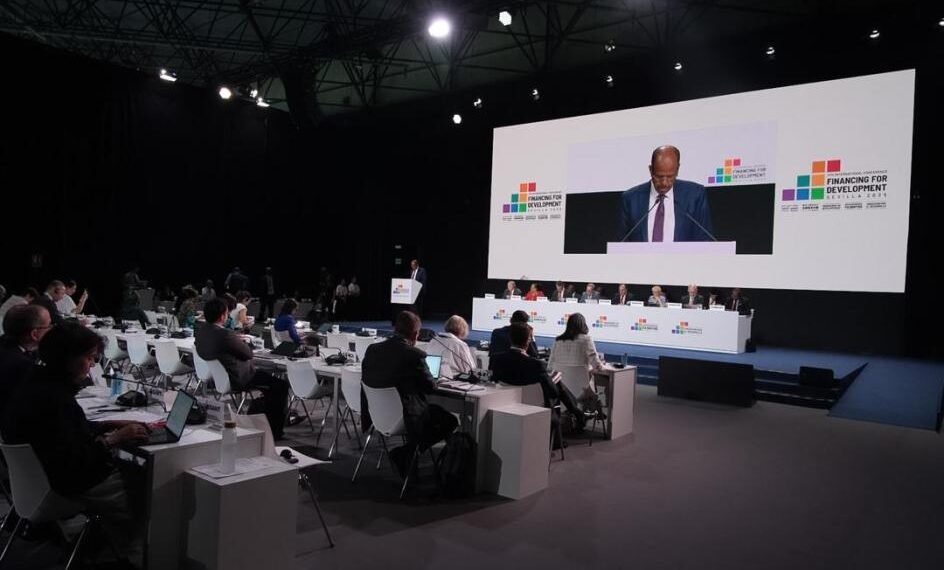Delivering a keynote address at the Fourth International Conference on Financing for Development (FID4) in Seville, the Chairperson of the African Union Commission, H.E. Mahmoud Ali Youssouf, called for sweeping reforms to the global financial system.
Speaking under the theme “Leveraging Private Business & Finance,” he urged that unlocking Africa’s full potential requires overhauling outdated financial structures and embracing inclusive growth strategies powered by private sector engagement.
Youssouf stressed that “private business & finance are not merely complementary, but catalytic for inclusive growth, job creation, and the green transition.” He highlighted the transformative potential of the African Continental Free Trade Area (AfCFTA), encouraging deeper support for micro, small, and medium enterprises (MSMEs), sustainable finance, and foreign direct investment (FDI).
“Africa is young, resource-rich, and ready,” he declared. “Let’s align capital with our development priorities and build a 21st-century financial architecture that works for all.”
‘Broken’ Financial System Pulls On Africa
The speech comes as criticism of the current global financial architecture continues to mount. The current global financial system, established in the aftermath of World War II, is a complex network of institutions, regulations, and mechanisms designed to facilitate international economic transactions and resource flows.

This system includes major players such as the International Monetary Fund (IMF), the World Bank, and regional development banks, alongside national central banks and private financial markets. Its core functions are to enable trade, pool resources, manage financial risks, and provide price information, thereby supporting global economic stability and growth.
However, despite these objectives, the system has significant shortcomings, particularly in how it serves African and other developing countries. These nations face persistent challenges such as high borrowing costs, restricted access to international capital markets, and stringent conditionalities imposed by international financial institutions. Such conditions often exacerbate debt crises, as seen in countries like Ghana and Zambia, which have struggled with unsustainable debt burdens worsened by global market volatility and interest rate hikes by major central banks.
One fundamental problem is that the global financial architecture was designed for a very different world — one without the current scale of globalization, climate change, and systemic risks. Developing countries often pay disproportionately higher interest rates relative to their actual risk profiles, making investments in critical sectors like clean energy prohibitively expensive.
Moreover, liquidity access during crises is uneven; for example, during the 2021 IMF Special Drawing Rights (SDR) allocation, G7 nations received vastly more support compared to Africa, despite the continent’s larger population and greater vulnerabilities.
The system also suffers from underinvestment in global public goods such as pandemic preparedness and climate action, areas crucial for sustainable development. The multilateral development banks (MDBs), which should be pivotal in financing development, have seen their relative funding capacity diminish drastically over the decades, limiting their ability to meet the massive investment needs of developing countries.
In response to these challenges, African leaders and institutions are pushing for a new financial landscape that better reflects the continent’s development needs. This includes the establishment of African-owned financial institutions such as the African Central Bank, African Monetary Fund, African Investment Bank, and a Pan-African Stock Exchange. These institutions aim to improve Africa’s access to capital, ensure fair debt management, and provide impartial credit and risk assessments, thereby enhancing the continent’s financial sovereignty and resilience.
There is also a growing call for urgent reforms to the global system to align capital flows with Africa’s development priorities, including support for micro, small, and medium enterprises (MSMEs), sustainable finance, and foreign direct investment. The African Continental Free Trade Area (AfCFTA) is seen as a game-changer that could benefit significantly from a reformed financial architecture that supports intra-African trade and industrialization.
As such, the global financial system must evolve from a one-size-fits-all model to a more flexible, just, and responsive architecture that empowers African and other developing nations to pursue sustainable, inclusive growth on their terms. This transformation is critical not only for these countries but for global economic stability and shared prosperity in an increasingly interconnected world.
READ ALSO: Lawyers of NDC’s Ashie Moore Denies $800K Fraud Allegations























